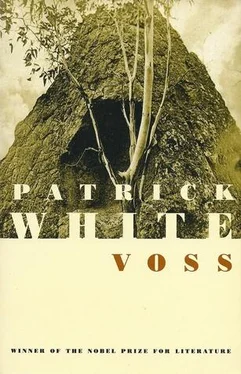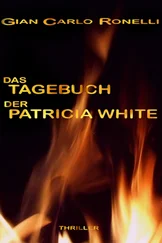The singing, as monotonous as grey earth, as grey wood, rose in sudden spasms of passion, to die down, down, as the charcoal lying. The voices of dust would die right away. To rise and sing. One voice, alone, would put on the feathers of parakeets in gay tufts of song. The big, lumbering pelican voices would spread slower wings. There was laughter, too, of young voices, and the giggling of black women.
‘At least I intend to observe this ceremony,’ the German announced, remembering a vaguely scientific mission.
He began to unfold his difficult legs.
‘No,’ said Jackie, in an unusually high, recovered voice. ‘No, no. Not now.’
So they continued to sit. Through the chinks in the very black twigs, blue was poured into blue, until there was no measuring its depths. Sparks were flying, or stars. There was the smell of hot wood-ash, and cold stars.
Before the end came.
There was a definite end.
‘Do you hear, the heathen blacks have stopped?’ said Harry Robarts, the clumsy white boy.
Jackie had gone from there, followed by his two women, now as cold as dead lizards.
The silence seeming to allow their freedom to the trinity of whites, Voss went to the door, and was looking out.
‘Look, Frank, Harry,’ he called, ‘at this unearthly phenomenon. Whatever may happen, it is too beautiful to ignore.’
His voice trembled from the effort of breaking the bonds of language. His woodenness was falling from him, and he was launching out into the fathoms of light.
‘Lord, sir, what is it, then?’ asked Harry Robarts.
‘It is evidently a comet,’ said Le Mesurier.
Harry was ashamed to ask for further explanation, but bathed in his reverent ignorance. It was beautiful. He was hollow with it.
Now the darkness was full of doubt and almost extinguished voices. The branches of trees, or black arms, were twitching, as Voss continued to observe the quick wanderer, almost transfixed by distance in that immeasurable sky. His mouth, thirsty for so long, was drinking down the dark blue.
‘Yes. A comet, evidently,’ he was gulping.
Then Jackie was standing in the silence.
‘Why are you afraid?’ Voss asked.
The blackfellow was quite cold.
But, with his dark body and few words, he began to enact the story of the Great Snake, the grandfather of all men, that had come down from the north in anger.
‘And what are we to expect?’ asked Voss humorously. ‘This angry snake will do what?’
‘Snake eat, eat,’ cried the black boy, snapping at the darkness with his white teeth.
Voss was roaring with pleasure.
‘Then the blacks will not kill us?’ asked Harry Robarts. ‘We are saved?’
‘If we are not devoured by blacks,’ Voss replied, ‘or the Great Snake, then we shall be eaten by somebody eventually. By a friend, perhaps. Man is a tempting morsel.’
Harry, who could not understand, was comforted, rather, by his more immediate prospects.
Voss addressed the aboriginal.
‘You want for white man save blackfellow from this snake?’
The explorer, however, was still laughing. He was so light.
‘Snake too much magic, no good of Mr Voss,’ Jackie replied.
‘Then you do not believe in me,’ said the German, suddenly sober, and as if he had really expected to find someone to replace himself in his own estimation.
The night was quiet as the blacks lay against their fires, under the coils of the golden snake. They would look up sometimes, but preferred that the old men should translate this experience into terms they could understand. Only, the old men were every bit as unhappy. All their lives haunted by spirits, these had been of a colourless, invisible, and comparatively amiable variety. Even the freakish spirits of darkness behaved within the bounds of a certain convention. Now this great fiery one came, and threatened the small souls of men, or coiled achingly in the bellies of the more responsible.
During the night, after Voss had crawled forward to put some sticks upon the fire that had been lit at the mouth of the twig hut, Le Mesurier asked softly:
‘What is your plan, then?’
‘I have no plan,’ replied Voss, ‘but will trust to God.’
He spoke wryly, for the words had been put into his mouth.
Le Mesurier was blasted by their leader’s admission, although he had known it, of course, always in his heart and dreams, and had confessed it even in those rather poor, but bleeding poems that he had torn out and put on paper.
Now he sat, looking in the direction of the man who was not God, and, incidentally, considering his own prospects.
‘That is a nice look-out for us,’ spluttered the abject disciple.
‘I am to blame,’ said Voss, ‘if that confession will make some amends.’
He sat humbly holding a little leaf.
‘If you withdraw,’ Le Mesurier began.
‘I do not withdraw,’ Voss answered. ‘I am withdrawn.’
‘And can give us no hope?’
‘I suggest you wring it out for yourself, which, in the end, is all that is possible for any man.’
And he crumpled up the dry leaf, Le Mesurier heard.
The latter had expected too much of hands which were, after all, only bones. As it grew light, he found himself looking at his own transparent palms.
Meanwhile, what had become of the fiery snake? As they engaged in their various daylight pursuits, of hunting, digging for yams, mending nets, and paying visits, the general opinion of the sobered tribe was that the Great One had burrowed into the soft sky and was sleeping off the first stages of his journey to the earth. The whites were now ignored, as being of comparative unimportance. All men were, in fact, as wichetty grubs in the fingers of children. So the tribe remained entranced. Their voices spoke softer than the dust, their shoulders were bowed down with the round, heavy sun, as they continued to wait.
The white men in their twig hut were offered no alternative. In the silence and the course of the day they listened to the earth crack deeper open, as their own skulls were splitting in the heat.
Frank Le Mesurier began to go through his possessions, flint and tinder, needle and thread, a button, the shreds of stinking shirts, the ends of things, the crumbs, the dust, all the time looking for something he had mislaid, and did eventually find.
This book no longer bore looking at, although his life was contained in its few pages: in lovely, opalescent intaglios, buckets of vomit, vistas of stillest marble, the livers and lights of beliefs and intentions. There was the crowned King, such as he had worshipped before his always anticipated abdication. There was Man deposed in the very beginning. Gold, gold, gold, tarnishing into baser metals.
During the afternoon, this wreck of an ageless man hobbled out through the crackling heat, out and away from the edge of the camp, as if called upon to ease nature. There was a skeleton of a tree, he saw, in white, bleached wood. He could see the distinct grains of dust. After he had sat a while, unoccupied, at the foot of the tree, he began to tear up the book, by handfuls of flesh, but dry, dry. His lips were flaking off. The blood must dry very quickly, he imagined.
And that is exactly what it did.
Bracing himself against the tree, Frank Le Mesurier began to open his throat with a knife he had. Such blood as he still possessed forgot itself so far as to gush in the beginning. It was his last attempt at poetry. Then, with his remaining strength, he was opening the hole wider, until he was able to climb out into the immense fields of silence.
The body of Le Mesurier glugged and blubbered a little longer before lying still. Even then, one of the ankles was twitching, that had come out of the large boot. Everything was too large that had not shrunk.
Читать дальше












